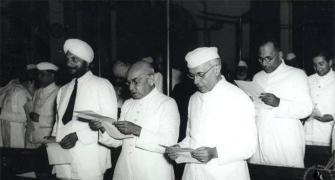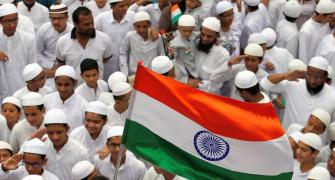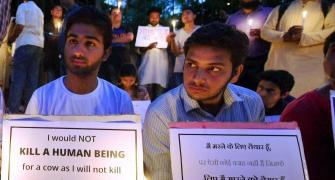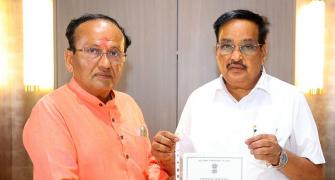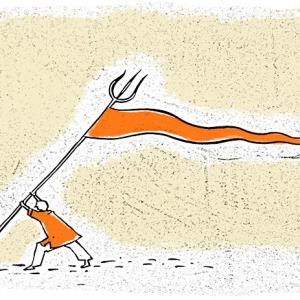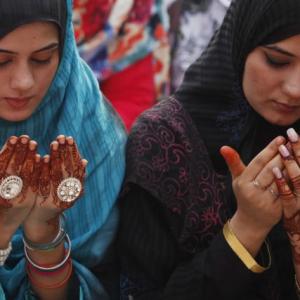'The objective is not to make India into a one religion place, but to ensure that there is harmonious and peaceful co-existence of all faiths with each of them having their cultural personality.'

Today, the chants 'Bharat Mata ki Jai' and 'Vande Mataram' have seen violence under the guise of making others raise them.
Not many of us know the origins of the slogan 'Bharat Mata ki Jai'.
For those who don't, Awakening Bharat Mata -- The Political Beliefs of the Indian Right by Bharatiya Janata Party ideologue Swapan Dasgupta is the book to turn to.
Member of Parliament, journalist and author, Dasgupta delves into the past of the Hindu Right in his latest book and reveals amazing facts -- like it was not Vinayak Damodar Savarkar who coined the word Hindutva first, as popularly believed, but writer Chandranath Basu who coined this word in the 1890s.
Awakening Bharat Mata provides a unique perspective on the politics of the Hindu Right and is a must read if you are a student of Indian history.
"Hinduism is a multiplicity of faiths which is bound together by common cultural bond. It is not something which comes out of a doctrine. There is no doctrinal impulse there," Dasgupta, below, tells Syed Firdaus Ashraf/Rediff.com in a telephone interview.
Why did the Indian secular State reject its Hindu past for 70 years? Was it deliberate?
I don't think it was an act of premeditation.
What happened was that there was a mistaken assumption that modernity meant rejection of the past and beginning into, an initiation of, a new journey.
So the past was kept in wraps without necessarily rejecting it.
That is how it started.
As it evolved, it became more and more about a notion of secularism, which meant that secularism would be detached from culture and by implication history.
This is precisely what happened.
It led to a great amount of distortions in India and some of those distortions have in turn provoked a bit of backlash.
What we see a lot in politics of this country today is a consequence of those things.
So I would not say it was premeditation, but I think it is a series of unintended consequences at the heart of which was a rather spurious definition of modernity.
What was the origin for your book Awakening Bharat Mata?
The idea (of Awakening Bharat Mata) is that the nation is sacred and subsequently that nation was deified into the status of a goddess.
For that the most important creation was Bankim Chandra Chatterjee's Vande Mataram.
Subsequently, some of the early nationalists, most notably Sri Aurobindo Ghosh and people like Bipin Chandra Pal, who popularised it and gave it a very significant political context in the national struggle.
That is how the origin of the term (Bharat Mata) came into being and acquired popularity gradually over time.
The idea of Bharat Mata is inextricably linked with the notion of Vande Mataram.
You write that the quest for a New India has invariably involved the rediscovery of an Old India. Do you mean that the India which we are seeing in 2019 is the same India envisaged in the 1890s by the Indian Right?
No. The India of 2019 is very different from the India of the late 19th century or early 20th century. It is a very different India.
In those times we were still grappling with the loss of national sovereignty.
Today, we have national sovereignty, that's the most important change.
Secondly, the nature of India has geographically changed partly because of the consequence of Pakistan.
Thirdly, the extent of self-confidence of our people has grown tremendously.
Most important is that prosperity in India has grown.
It is a bit like this, as we often make the mistake that the nation came into being in 1947. The Indian Republic came into being in 1947 and the nation is much older.
It is just that the intermingling of old India and new India which poses a great challenge.

Was this flame of old India alive in Hindu minds, that India was a Hindu country ruled by conquerors and invaders for 1,200 years? Or did they simply accept the Mughals as their leaders?
In India, we always had a sense of national community. That national community pre-dated the loss of political sovereignty.
Secondly, there was never an idea of one State of India.
If you see history, you will see India was fractured into a lot of smaller kingdoms etc.
There was never a political unity, but far more important, there was an idea of India which was absolutely cultural.
When I say cultural, it incorporates religion, but not exclusively religious.
The loss of sovereignty during the period of Delhi sultanate right till 1947 was that you had both of these co-existing at the same time; loss of political power and political sense and at the same time a deepcultural alienation.
It existed, and it is probably after a very long time today that we have the cultural unity and political unity actually blending.
That is a new development.
But when we read history, we are told the Mughals were very secular in their outlook. They also participated in Hindu festivals. Was this all incorrect history then?
I never said that.
Firstly, the word 'secular' is wrong.
The Mughals exercised political power and to exercise that political power they had to make adjustments and seek alliances with people, which involved Hindus.
That is the inescapable reality.
Secondly, not every Muslim ruler had the idea that they must convert India into Darul-Islam (Land of Islam). They were far more practical about these things of co-existence.
They were more interested in wielding power rather than be on some religious mission.
But there is no doubt that Hindus felt a sense of subordination.
That sense of subordination wasn't always uniform and it varied over time and varied from ruler to ruler.
In some cases they must have felt more deeply, which is why you had uprisings during Aurangzeb's time, and they felt it far less at the time of Akbar probably.
So it was not a uniform thing, but the word 'secular' is not the right word.
That word was not relevant in the past as secularism is a modern concept.
Many people argue that if India had not taken the path of Nehruvian secularism and instead accepted the Hindu Right's path after 1947, it would have ended up like Pakistan, a failed State. Do you agree?
We don't know.
There is great counter factual history.
What we can say is (Jawaharlal) Nehru certainly made innumerable contributions in the establishment of democratic institutions of India.
Nehru played a very important role in ensuring there was political stability in India.
Nehru played an important role in ensuring that India did not become a Hindu variant of Pakistan.
In the process, Nehru, in his vision of modernity, did not sufficiently incorporate elements of our cultural personalities.
As a result, more than Nehru, his successors really messed up this project and as a result you had a backlash.
Now it is difficult to say what would have happened if Nehru was not there.
It is impossible to say today what would have happened if Nehru was not there.
Nehru detested Hindu revivalism, and one gets that impression after reading your book.
Certainly, you are right about that.
Nehru had a certain allergy to any form of Hindu symbolism in political life.
He believed economics was the thing that most mattered.
As I said, the unforeseen consequences of that was his successors tried to underplay the cultural personality of India.
When Nehru ruled, the Congress had a schizoid personality.
At the top there was Nehru with his modernist vision, but underneath,the base of the Congress was very much reflected of the very larger legacy of the freedom movement.
I have pointed out in my book that in the freedom movement there was mobilisation and that mobilisation was Hindu in character.
Similarly, under Nehru's regime, while he was at the top, the Congress chief ministers and provincial Congress leaders operated in a sort of different way.
When was that particular strain in Indian politics snuffed out of the Congress?
That happened after 1969 where you saw the Congress evolve into something which became culturally detached from some of the impulses of the Indian people.
The consequences are there and therefore today it is necessary for Rahul Gandhi to establish their Hindu credentials by doing temple tours.
What about the fear that fascism comes through democracy? Do you feel that is happening in India as some Christians and Muslims feel that India will or rather has turned out into a Hindu fascist State?
I think the term fascism is loosely used.
I don't think there is any danger of India either becoming authoritarian or theocratic.
The reason: Hinduism is a multiplicity of faiths which is bound together by common cultural bond.
It is not something which comes out of a doctrine. There is no doctrinal impulse there.
Secondly, the idea of other religions in India co-existing has always been there.
The objective is not to make India into a one religion place, but to ensure that there is harmonious and peaceful co-existence of all faiths with each of them having their cultural personality.
Now the important thing here is that even those who are Muslims have certain responsibilities with the rest of the people.
It is for them to recognise that there is a common heritage.
These are not necessarily water-tight compartments where you accumulate the past by being in the present.
Part 2: 'Time for BJP to initiate conversation with Muslims'

